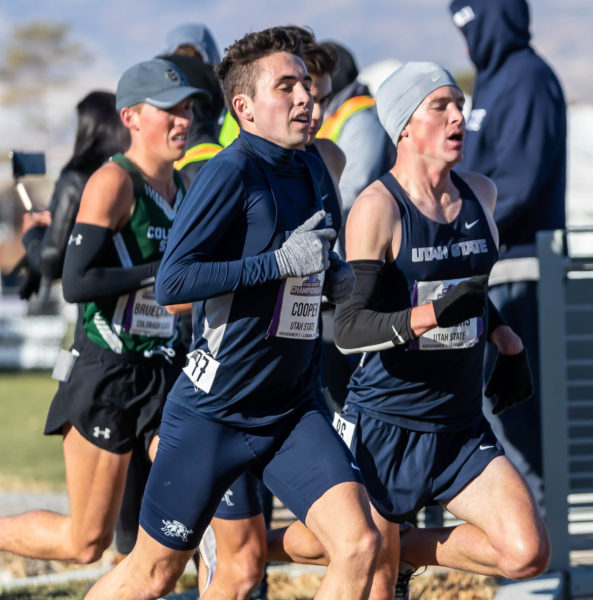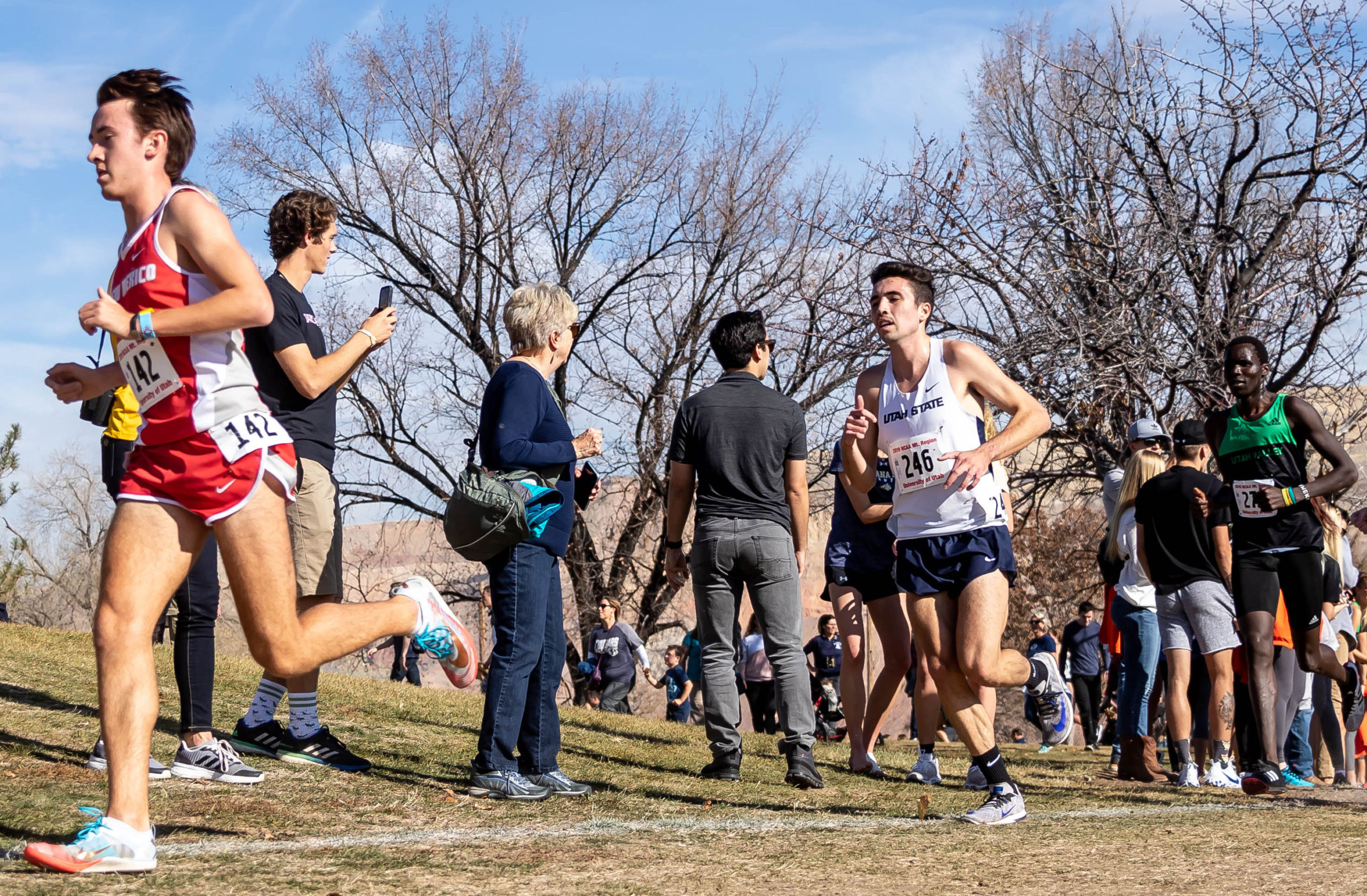Cooper next in line for USU men’s XC
Few student-athletes on campus have been affected by COVID-19 as much as the distance runners, who lost their outdoor track and field season last spring and the cross country season this autumn.
But despite not having any races to compete in, the Utah State men’s cross country team is training with a level of urgency, to reload on talent before kicking off an abbreviated cross country season in January.
The 2019 Mountain West champions and No. 16 finishers at the NCAA championships, the Runnin’ Aggies, have to find a way to replace a lot of speed and experience. Arguably their top five runners all graduated: James Withers, JD Thorne, Dallin Farnsworth, Adam Hendrickson, and Luke Beattie.
“We lost a lot of guys from last year who were great leaders for the team,” said head coach of the mens and women’s cross country teams Artie Gulden. “We were wondering who would step up this year to fill that role.”
One athlete ready to step up to the task is Haydon Cooper, a senior from Mapleton, UT, who is hoping “the ball gets rolling” for himself and his teammates once competition resumes.
“Haydon has done a great job. His teammates recognize that, too, since they elected him to be one of their captains,” Gulden said. “Haydon will continue to help lead the team through this uncertain fall so that they are ready when we are able to race as a team again hopefully in January.”
The team had been able to meet together for practice every day. With this being “a bit of a rebuilding year,” Cooper, along with guys like junior Caleb Garnica and fellow senior Jacob Tew — whom he mentions as other team leaders — are using this time to implement the team culture that has been previously established.
“We have a young team and so our goal is to try to instill the team culture that’s led to so much success,” Cooper said. “We’re trying to continue to build upon that and teach some of these younger guys what it means to be an Aggie.”
The guys are practicing with a level of intensity.
“We’ve just been trying to make a big emphasis on practicing how to compete, even without competition,” said Cooper. “So just trying to encourage guys in workouts to compete with each other, not necessarily in an unfriendly way but to help push each other. I think that keeping a focus on competition and improving that competitive fire has been a big key for us.”
Another major focus during the prolonged off-season is to build team strength, or endurance. Putting in the mileage is the most important thing a distance runner does to improve because it increases an athlete’s aerobic fitness level, which helps determine your Vo2 max.
Vo2 max — the maximum amount of oxygen that your heart can pump and your muscles can use in a given period of time, according to the American Running Association — is a difficult metric to measure. But the best male collegiate runners have a Vo2 max of 70 to 80 and beyond. For reference, a good Vo2 level for a 25-year old male is 45.
Many athletes on the Aggies men’s team are running 70-90 miles a week, with more experienced runners like Cooper and Garnica running 90-100 miles — some at high intensity — all in an effort to increase endurance and Vo2 max.
How things go in 2021 remains to be seen, but the general consensus is that these efforts are ameliorating the team.
 Wade Denniston
Wade Denniston “I feel like the team itself is improving a lot,” Cooper said.
Coach Gulden agreed.
“I think they’ve all enjoyed being able to practice again and they look forward to racing as a unit again when the time comes. But, the best part of all this is they are really moving forward as a team, which I know will pay dividends when it’s time to compete again.”
On Sept. 22, the NCAA board of directors approved a proposal to push the cross country season back to the spring semester, meaning the team will have a chance to compete sooner than was initially thought after the cancellation of the season. The planned season commences in January and ends with the NCAA championship race on March 15.
But there are multiple logistical hurdles in place — beyond the pandemic — that were highlighted by the NCAA in an official release.
“There is some concern in the membership about conducting cross country, indoor track and field, and outdoor track and field in the spring term.”
The indoor season is scheduled for the same time as cross country, with its championship set for March 13. Coach Gulden and others will have a decision to make: which sport will the distance athletes compete in?
“I don’t care if it’s indoor track or XC, I’m just excited to be able to compete again,” Cooper said.
It is likely that student-athletes won’t have to use a year of eligibility to compete in the winter cross country season, so Cooper could race as for a fifth season next fall. While staying in college an extra year may be difficult for some athletes, for Cooper it would work out because he’s on a five-year plan for his degree.
As the season approaches he believes he’s ready to turn a corner in his career.
“The last couple of years have been really great strength-building years and I think that it takes some time to build that strength before you can really compete,” Cooper said. “I feel like now that I have some strength built up I think over the next year, year and a half it will come into play and help me be a lot better.”
His ultimate goal is to become an All-American, and his best opportunity to do that is in the outdoor track 5,000-meter race, where he boasts a personal best of 14:24.59. He would first have to run a sub 14:00 minute which could get him into regionals and then from there qualify for the NCAA championships.
Cooper is grateful to be chasing his goals while wearing an Aggie uniform.
“It’s by far the best decision I’ve made so far (to come to USU) and I think that I’ve grown so much, not only as an athlete but as a person.” But don’t mistake satisfaction for complacency. “I’m pretty confident that the best is ahead of me.”
@jacobnielson12
— sports@usustatesman.com

